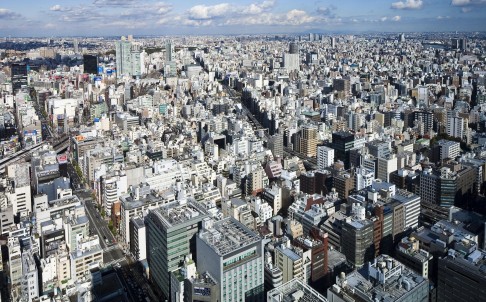 Low-priced homes in Japan are attracting investors.
Low-priced homes in Japan are attracting investors.
The unexpected devaluation of China's yuan is likely to accelerate buying interest for overseas property among mainland Chinese to protect their wealth, but capital will shift away from emerging markets to avoid rising currency risks.
Despite the fact that owners of Asian properties have seen their wealth sharply reduced by an escalation in currency risks in the region, industry experts say there has not been any panic selling yet.
"Mainlanders mostly buy overseas homes for immigration, for their children who are studying overseas or as holiday homes. They will be unlikely to sell in haste unless big problems arise with that country's property market such as political unrest," said Thomas Lam, the head of valuation and consultancy at Knight Frank.
On Monday, Morgan Stanley identified South Korea, Thailand and Singapore as three of the "troubled 10" countries whose currencies are at risk since China devalued the yuan.
The yuan has lost 3 per cent against the US dollar since the People's Bank of China shocked the markets by devaluing the currency by 1.85 per cent on August 11, the most in a single day in more than 20 years. Some regional currencies also extended their falls to this week, triggering concerns about a currency war in Asia.
During the past week, the Singapore dollar dropped 1.75 per cent, the Korean won lost 1.67 per cent, while the Thai baht was down 1.26 per cent against the greenback.
He, however, expects ultra-high-net-worth Chinese investors will make buying decisions for overseas properties in global gateway cities before the yuan weakens further.
"As the yuan will in any case have to fall, rich Chinese will likely either shift their savings into other currencies or buy overseas properties in other markets with higher yields as a way to hedge risk," he said.
Lam said a Chinese firm had just bought a piece of land in Sydney for A$300 million due to currency concerns.
Frank Marriot, a senior director of the real estate capital market for Asia Pacific at Savills, expects outbound real estate investments from the mainland to exceed US$20 billion.
The previous peak was nearly US$16 billion in 2013, according to Real Capital Analytics.
"Even if the yuan is becoming less and less attractive, the point is yields in other countries, such as Australia, are more attractive than at home," he said.
He believes Chinese appetite for overseas properties remains keen as institutional investors, developers and even small investors are looking for diversification.
The lure of low-priced homes in Japan has tempted Hong Kong businessman Tang Tsz-kin, who opted to retire in Shenzhen in 2008, to make his first acquisition in Japan in the middle of last year.
To further invest in Japan, he decided to exit the mainland Chinese property market by selling four out of five apartments he owned in Shenzhen for 8.2 million yuan this year. He invested HK$8.8 million in two apartments and one house in Japan.
"Except the one I use as my home, I sold all my assets in Shenzhen," he said.
Tang was partly caught in the regional currency tug-of-war.
He did escape losses from the surprise yuan devaluation as he converted his remaining sales revenue into Hong Kong dollars.
But his venture into the Japanese property market was hit by 1 per cent to a 9 per cent fall in the Japanese yen from what he had paid for the three homes.
Undaunted by the steep fall in the yen, he remained upbeat about his investment.
"Compared with China, Japanese properties have a greater upside potential," he said, adding his buying decision was based on the Japanese yen having dropped so far, which would minimise the risk for another sharp fall.
But Shenzhen property prices were close to their peak while the yuan had just started to fall, he said.
"I sense it is time to exit my investment in Shenzhen," he said.
Tang's four apartments, which he bought between 2004 and 2009, have jumped as much as sixfold since then.
Lam of Knight Frank said Japan, Malaysia, Portugal and recently New Zealand were popular markets among China's bourgeoning middle class.
"These groups will be most affected by the yuan devaluation as overseas properties are getting more costly for them," he said.
Megan Walters, the head of research for Asia Pacific capital markets at JLL, said Chinese money should continue to head to the US, Europe and Australia in search of higher total returns and benefits from diversification.
Total annual return (in local currency, without accounting for currency changes) is single-digit for Shanghai, but 10 per cent to 15 per cent for Sydney, New York and London while highest for Tokyo at 15 per cent to 20 per cent, she said.
"There may be a slight drop in the reported capital flows from China this year when reported in US dollars, lowered by the yuan depreciation; however, the relative attractiveness of overseas markets may boost the numbers upwards, disguising the effect of the currency drop," she said.
Walters said Chinese investors ranked as the single biggest foreign buyers of US homes in the 12 months to March this year.
Henry Chin, the head of research of CBRE Asia Pacific, said the formation of the Asian Infrastructure Investment Bank and the "one belt, one road" initiative were clear examples of President Xi Jinping's desire to encourage Chinese corporations to invest overseas.
"Chinese investors have become more experienced in overseas investments. Their decisions will be based on market fundamentals and the availability of deals. We do not expect that investments from China will ease next year," he said.
Tang said he would not sell his properties in Japan at the moment.
"Besides investment, I can use my Japanese properties as holiday homes," he said.
South China Morning Post
Please
contact us in case of Copyright Infringement of the photo sourced from the internet, we will remove it within 24 hours.
